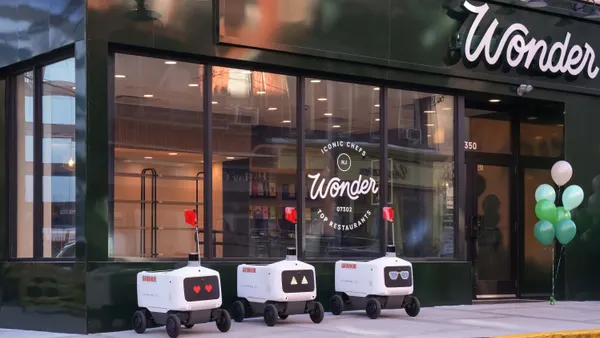UPDATE: Feb. 20, 2020: The bill will be amended to state that delivery apps must have a prior agreement with a restaurant before listing them on their platform after the bill has been in print for 30 days, Lorena Gonzalez's office told Restaurant Dive in an email.
Dive Brief:
- California Assembly Member Lorena Gonzalez introduced legislation on Tuesday that would authorize a food delivery platform upon request by a restaurant to share consumer information, including email address, telephone number and delivery address as well as the customer’s purchase history from the specific restaurant, Assembly Bill 2149 states.
- Restaurants may request information once per calendar year and the platform would need to furnish the information within 30 days of the inquiry.
- Consumers can opt out of having their personal information shared by the food delivery platform.
Dive Insight:
Following growing criticism of food delivery policies by independent restaurants, local and state governments are starting to look into regulating the food delivery industry. A proposed bill in Rhode Island would ban apps from including restaurants on their platforms without prior written consent. Assembly Bill 2149 will also address this issue in a coming amendment, Gonzalez's office told Restaurant Dive in an email, though specific language remains to be seen. California would be the second state to draft legislation targeting non-partnered restaurant listings, and could spur more states to follow suit as frustration over the practice grows among independent restaurants.
California is no stranger to regulating the gig economy. Gonzalez is the same sponsor of the controversial AB-5, which created stricter requirements for independent contractors to be considered employees entitled to benefits. Uber, Lyft, DoorDash, Instacart and Postmates are opposed to this legislation, spending millions toward a proposed ballot initiative that would classify drivers as independent contractors, according to the Sacramento Bee
Since this latest bill in California only allows restaurants to request customer information once a year, it may not impact the industry as much as AB-5. Many chains also have exclusive partnerships that include data sharing with food delivery apps. Other restaurants have built branded online ordering capabilities that push customers to order directly from the restaurant and then have third-party apps complete the delivery. These shifts come as customer data becomes increasingly important among restaurants, who are using that data to offer personalized marketing and customization.
The bill would be helpful for restaurants dealing with a customer complaint that is difficult to address without knowledge of the order or situation. Resolving those issues can be critical to maintaining loyalty and retaining its reputation. When there is something wrong with an order, 62% of customers blame both the restaurant and food delivery app. On the other hand, it could lead to data sharing problems with customers not wanting their information widely shared, but customers will have the option to opt out.












